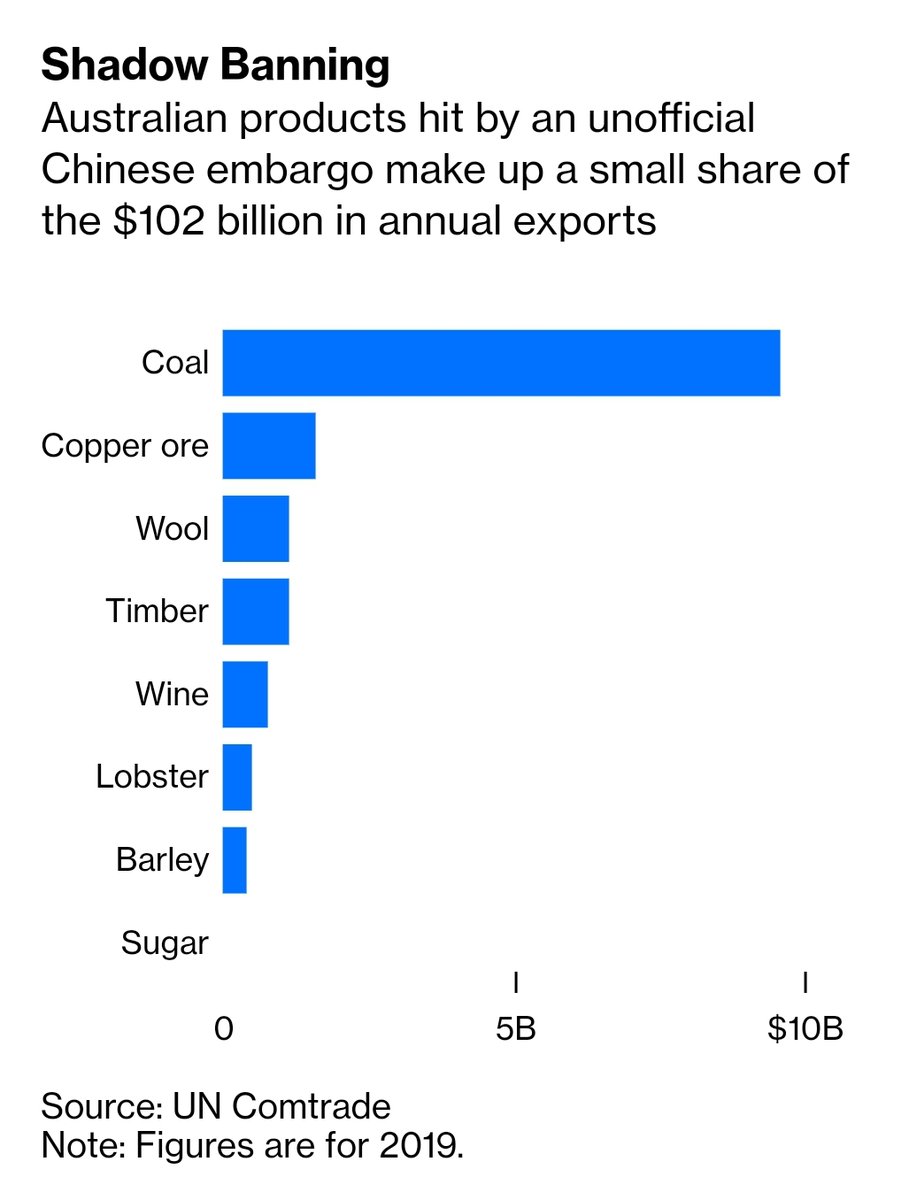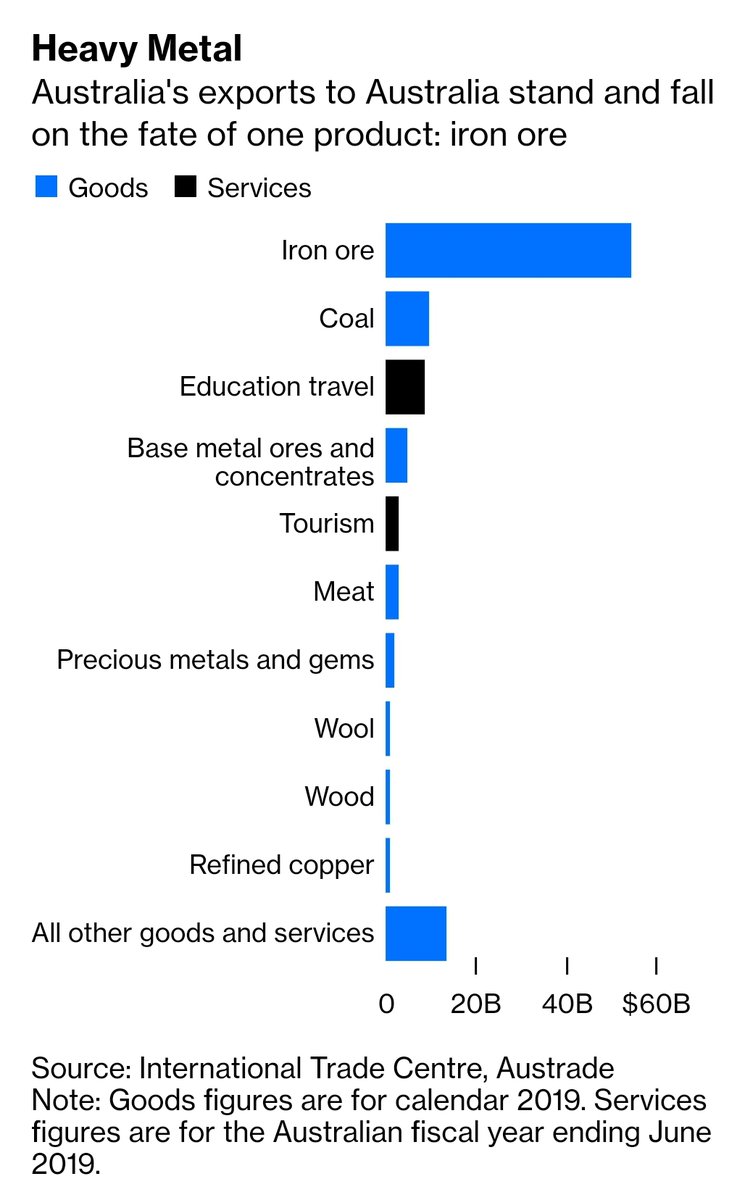
We all know about how "Advance Australia Fair" was first performed in the middle of a outbreak of race riots, right? 
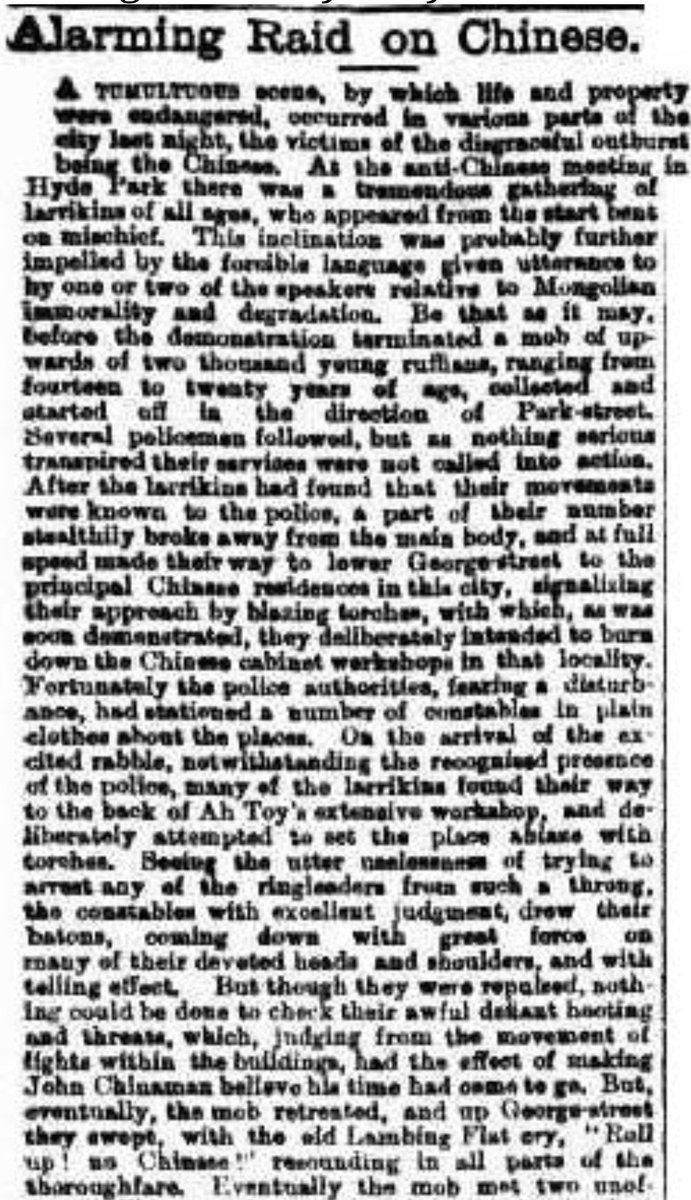
As @LukeLPearson points out here, the cosmetic change of one word is pretty pathetic.
But we've genuinely forgotten the context in which the song was written: an outbreak of anti-Chinese violence in 1870s Sydney, which ultimately led to Federation.
But we've genuinely forgotten the context in which the song was written: an outbreak of anti-Chinese violence in 1870s Sydney, which ultimately led to Federation.
https://twitter.com/IndigenousX/status/1344784440464080896?s=20
Here's the Sydney Morning Herald's account of its first performance on St. Andrews Day, 30 November 1878:
trove.nla.gov.au/newspaper/arti…
trove.nla.gov.au/newspaper/arti…
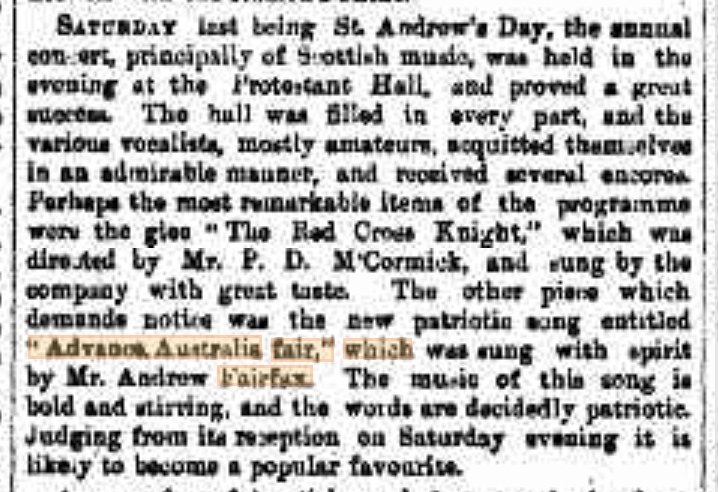
On the adjoining column is an account of an incident the same week when two well-dressed men in black coats and white shirt-fronts brutally attacked a Chinese man in Essex Street in the Rocks with a hammer: 
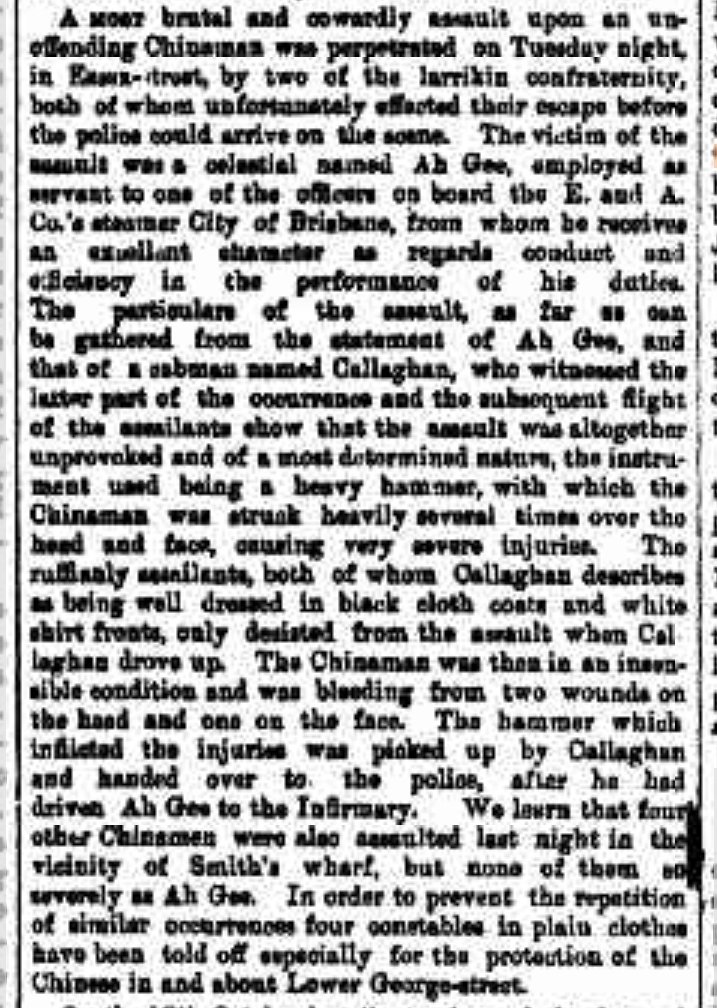
This wasn't an isolated incident. In fact, racist anti-Chinese agitation in November 1878 in Sydney was a crucial turning point in Australia's Federation as a unified country.
There had been periodic race riots against Chinese miners on the goldfields of Victoria and Queensland since the 1850s but the 1878 Seamen's Strike was the first time this came to urban Australia.
The Seamen's Union started agitating against the Australasian Steam Navigation Company in July 1878 about its hiring of Chinese labourers as ship crew. By November it had turned into a mass strike.
There was very serious unrest. After a meeting in Hyde Park on 4 December a few days after "Advance Australia Fair" debuted, a mob of 2,000 people carrying torches attempted to burn down a Chinese-owned business and attacked people in the street:
trove.nla.gov.au/newspaper/arti…
trove.nla.gov.au/newspaper/arti…
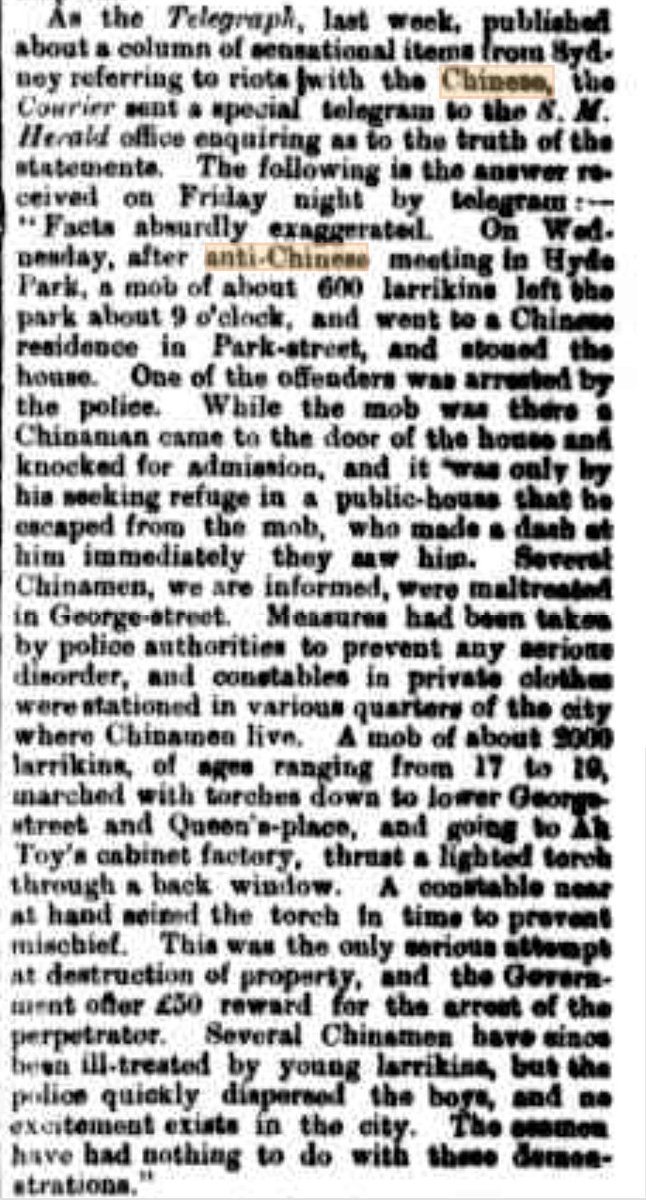
The agitation spread like wildfire.
The Sydney Evening News edition reporting another early performance of "Advance Australia Fair" in early December 1878 records anti-Chinese meetings in Bathurst, Mudgee, Goulburn, Wellington and Brisbane:
trove.nla.gov.au/newspaper/arti…
The Sydney Evening News edition reporting another early performance of "Advance Australia Fair" in early December 1878 records anti-Chinese meetings in Bathurst, Mudgee, Goulburn, Wellington and Brisbane:
trove.nla.gov.au/newspaper/arti…
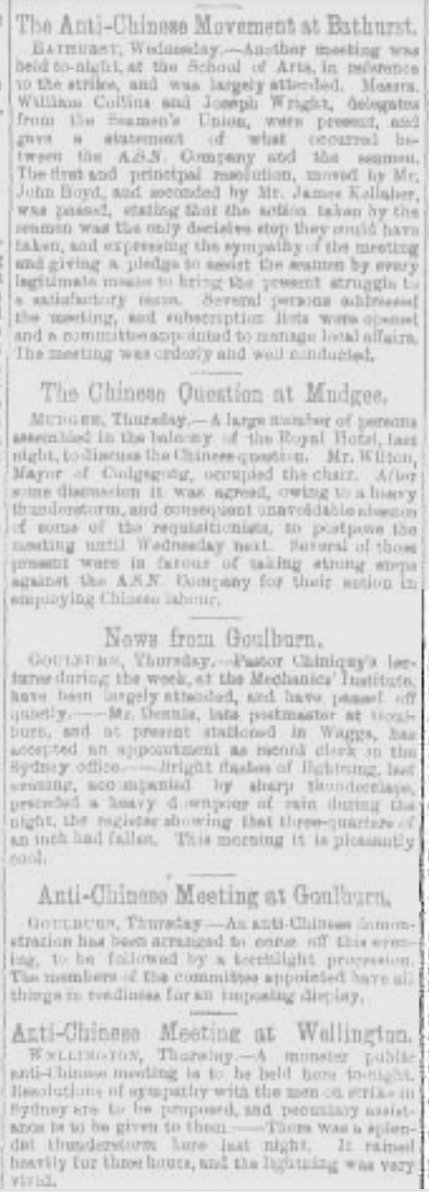
The Seamen's Strike was arguably the start of the union movement in Australia. It also led to 1881 legislation restricting Chinese migration into New South Wales.
The reluctance of most states to pass such legislation in line with NSW and Victoria was one of the driving forces behind Federation.
Read the original four-verse text of the song – with its lines about "English soil and fatherland" and promises to "rouse to arms" against "foreign foe" — and consider the race riots that were playing out in the same city when it was first performed.
trove.nla.gov.au/newspaper/arti…
trove.nla.gov.au/newspaper/arti…
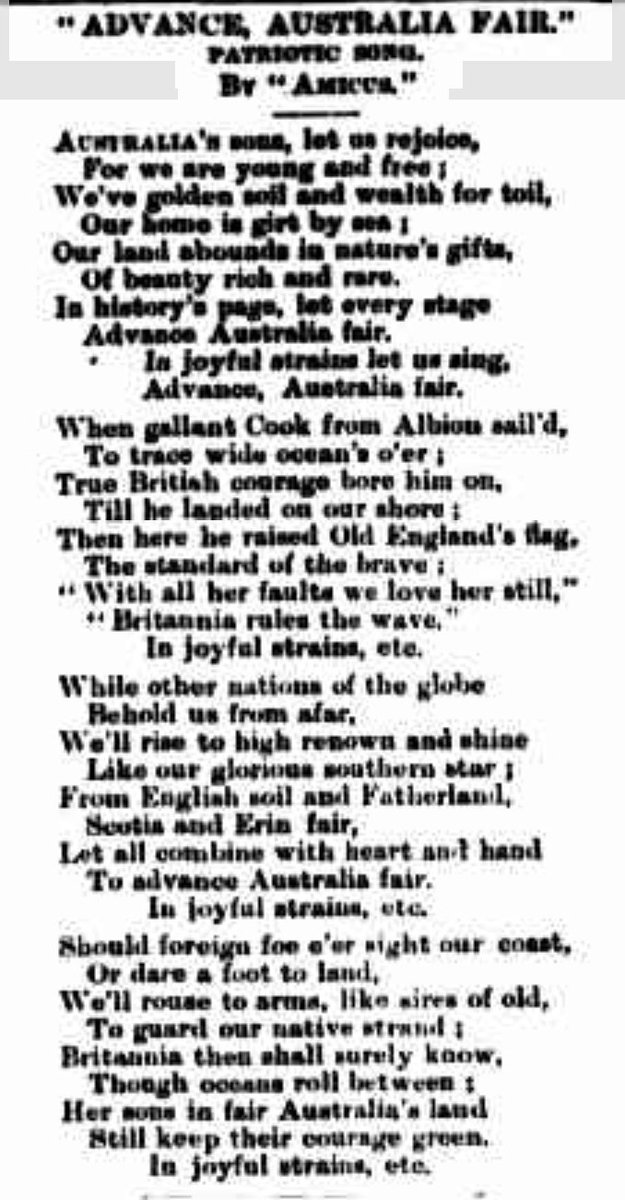
There aren't many good national anthems IMO, but that history does leave a particularly bad taste in my mouth, regardless of how much the lyrics are cleaned up.
One thing I didn't quite make clear here: While "Advance Australia" was a common patriotic motto throughout most of the 19th century meaning "let's develop this country", "Advance Australia *Fair*" is a very unique twist that's specific to this song.
"Fair" is an ambiguous word.
It could just mean "beautiful", as in "In Dublin's fair city, where girls are so pretty".
It could mean "egalitarian", as in "the Aussie fair go".
Or it could mean "blonde-haired and blue-eyed".
It could just mean "beautiful", as in "In Dublin's fair city, where girls are so pretty".
It could mean "egalitarian", as in "the Aussie fair go".
Or it could mean "blonde-haired and blue-eyed".
I think the song's longevity owes a lot to the fact that it doesn't quite commit to any of those meanings, so it can be read as celebrating environmental beauty and fairness rather than as a racist paean to northern European racial purity.
But again, think about it in the context of those race riots going on at the time the song was first presented.
It's not just saying "Advance Australia", it's advocating a particular subset of that vision, "Advance Australia *Fair*".
It's not just saying "Advance Australia", it's advocating a particular subset of that vision, "Advance Australia *Fair*".
Ah Toy, whose factory was almost set ablaze by "larrikins", wasn't "fair" in terms of blonde hair and blue eyes.
And I'm pretty sure the Seamen's Union didn't think it was "fair" that steamship companies employed Chinese sailors at below-union rates.
And I'm pretty sure the Seamen's Union didn't think it was "fair" that steamship companies employed Chinese sailors at below-union rates.
In all three original verses expurgated from the cleaned-up official anthem, the idea of Australia as specifically *British* is absolutely explicit.
"Fair" only occurs in one other place, in the line "From English soil and fatherland, / Scotia and Erin fair".
"Fair" only occurs in one other place, in the line "From English soil and fatherland, / Scotia and Erin fair".
This 1878 race riot was a founding moment for Australia as a nation, for the country that introduced the White Australia policy as one of its first laws after Federation. "Advance Australia Fair" was an anthem for that movement. 

"Fair" is sort of ambiguous, and shorn of its original context I don't think most read it as a racial epithet these days.
But isn't another word for that sort of ambiguity, that sort of plausible deniability, a "dog whistle"? Flashing OK signs is ambiguous, too.
But isn't another word for that sort of ambiguity, that sort of plausible deniability, a "dog whistle"? Flashing OK signs is ambiguous, too.
• • •
Missing some Tweet in this thread? You can try to
force a refresh




